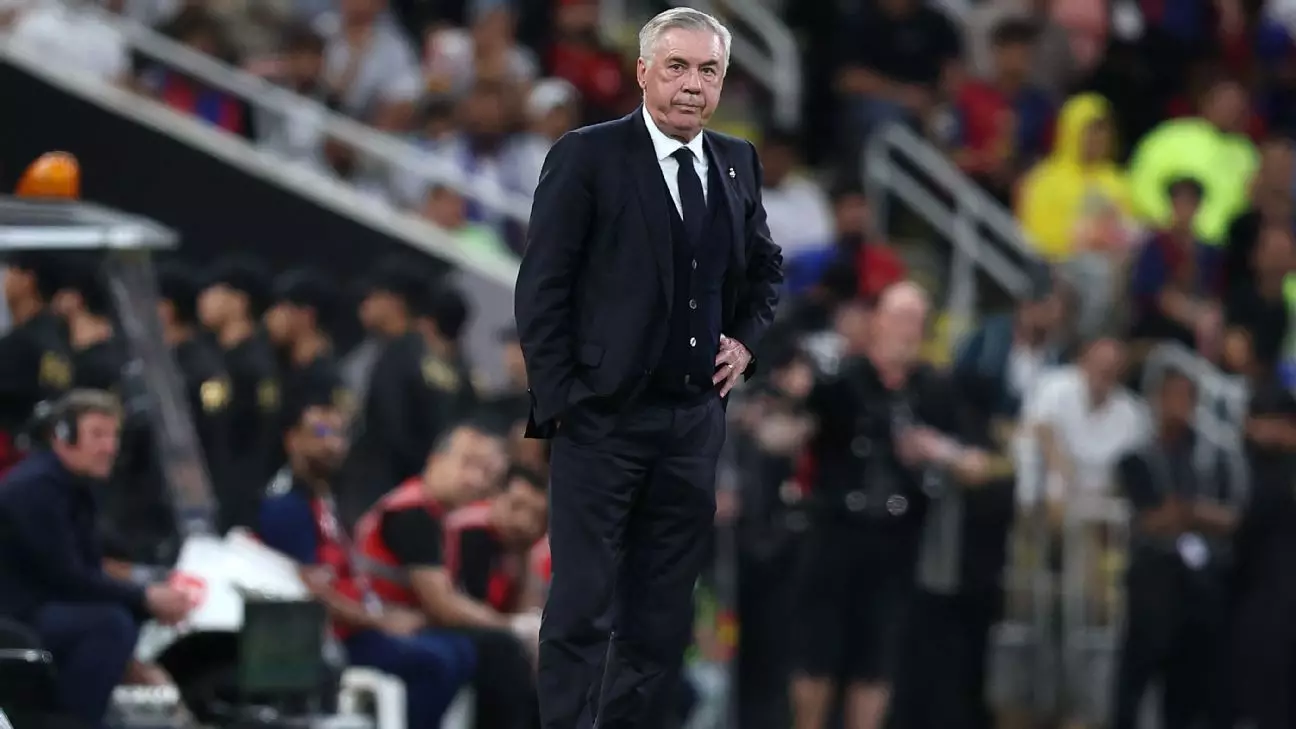The recent Supercopa final, where Real Madrid faltered against rivals Barcelona with a scoreline of 5-2, is a sobering chapter in the club’s illustrious history. The match, held in Jeddah, Saudi Arabia, has elicited strong sentiments from players, coaches, and fans alike. Beyond the surface-level analysis of the score, a deeper examination reveals several systemic issues within the Madrid setup that need urgent attention.
Carlo Ancelotti, Madrid’s head coach, expressed his feelings of sadness and disappointment in the wake of the loss, acknowledging a significant deficiency—poor defensive capabilities. His post-match observations echoed a well-known football adage: the best offense sometimes loses against a robust and disciplined defense. Despite taking an early lead through Kylian Mbappé’s fifth-minute goal, Madrid quickly unraveled as they allowed four unanswered goals from Barcelona. This sudden collapse not only left fans heartbroken but also raises questions about the resilience and mental fortitude of the squad. Ancelotti’s claims that the team failed to defend well underscore the need for a collective reassessment of defensive strategies, especially when transitioning between pressing and maintaining structure.
From a tactical perspective, Madrid’s approach appeared flawed. Ancelotti’s desire to apply a high press was immediately counterproductive against a Barcelona side well-equipped to exploit spaces left in the wake of such strategies. As the first half progressed, Real Madrid fell short in executing essential defensive duties. They frequently lost individual battles, allowing Barcelona’s attacking players to dominate in key areas of the pitch. The overreliance on individual brilliance—exemplified by Mbappé’s contributions—reveals a potentially troubling dependency that could hinder long-term success. The fact that Madrid struggled against a team seemingly lacking in form prior to this fixture raises flagpoles in their mentality and preparation.
High-Stakes Performance Metrics
With this Supercopa defeat being their second major stumble within a short window, Real Madrid must reassess their performance metrics. An excellent season at the onset, including some dominant displays, is now marred by inconsistencies that need urgent addressing. Players must not only be held accountable for their performances but also engaged in a more serious conversation about what it means to represent a renowned institution like Real Madrid. The philosophy of the club demands not only skill but also spirit and solidarity—qualities that were glaringly absent in this match.
Looking Ahead: A Call for Unity and Recovery
Luka Modric, one of the more seasoned figures within the squad, expressed optimism despite the heavy defeat. His remarks that the team must stay united signal an important introspection among players. It suggests that they are aware of the challenges lying ahead, both on an individual and collective level. Such sentiment should not only serve as a rallying cry for players but also resonate within the fanbase. Football is as much about the journey as it is about the results, and every setback offers a chance for growth.
Furthermore, Ancelotti’s acknowledgment of the myriad challenges faced—specifically the inability to capitalize on the advantage gained from Szczesny’s red card—should lead to an in-depth tactical review. The need for proactive and dynamic solutions is paramount, and such a realization can often catalyze the changes needed to steer the team’s fortunes back onto a winning trajectory.
Final Thoughts: Emphasizing the Bigger Picture
While the disappointment of losing the Supercopa final to Barcelona weighs heavily on the shoulders of the Madrid community, it is essential to extract lessons from the defeat. This event should galvanize the team towards reclaiming their competitive edge, examining both their mindset and tactical framework. As Madrid gear up for the Copa del Rey and La Liga fixtures, it is imperative they carry forward not just the pain but also the resolve to rise stronger. The road ahead is long, but as history has shown, setbacks often pave the way for significant comebacks in the realm of sports.

